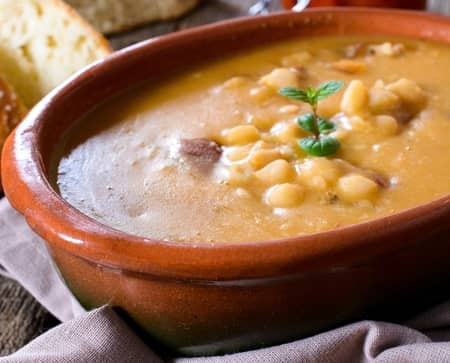This is a question that comes up fairly often for a couple of reasons. The main reason is that there’s a bit of confusion around the different types of fats used in baked goods. The other is that some folks aren’t familiar with the word, so when they encounter it on labels, they’re astute enough to ask if its vegan.
Is it vegan? Lard is never vegan, as it is simply another word for pure animal fat—namely, hog fat.1 It has a number of uses in the food industry such as shortening. Lard used in food is animal fat in its “rendered” form—rendering is the process that converts waste animal tissue into a usable form.
For commercial use, the crude fat is deodorized. Antioxidants are usually added to prevent oxidation and increase shelf life.1
The fact that lard is used for shortening is a source of confusion as far as its vegan status. While shortening is really any fat that’s solid at room temp and can be used to give pastry and other food products a crumbly texture, the term “shortening” usually refers to vegetable shortenings like margarine and fully hydrogenated oils.
Also, butter is a source of fat that’s solid at room temperature and is often used in pastry making, but (for whatever reason) the term “shortening” is rarely used to refer to butter.2
As you can probably tell by now, fat has a number of uses in the food industry and can be acquired from both plant and animal sources. As such, the task of determining what’s vegan and what’s not can seem daunting at first.
Over the years, fat’s desirable functions in foods and food preparation have resulted in many different types of fats in the baking section of supermarkets with some of the most common products being of animal origin.
Luckily for vegans, plants also constitute a huge source of fat for use in foods, the most common sources being:3
- Nuts and seeds and their derivative butters
- Avocados and avocado oil
- Olives and olive oil
- Coconuts and coconut oil (an important plant source of saturated fat)
- Cocoa butter
- Margarines—mostly oils with water held together by an emulsifier
I say luckily because lard was the primary form of shortening used in the early 1900s. Tallow was also used—tallow is animal fat, but derived from beef cattle or sheep instead of swine. Then there was suet which is the solid fat found around the loin and kidneys of beef and sheep.
Nowadays, we have many more options that are not only vegan but tend to be used by manufacturers as they’re more economical.
Vegetable Shortening: The Vegan Lard Replacement
Above it was mentioned that shortenings are fat sources that remain solid at room temperature. You might be wondering how on earth plant oils, which are liquid at room temp, could serve as shortening.
Enter vegetable shortenings. These are plant oils that have been hydrogenated to become more solid and pliable at room temperature.
You’ve probably heard of the evils of trans fat, aka partially hydrogenated oils. They’ve been linked to everything from climate change to the Manson family. Maybe that’s going too far, but you get the idea.
Trans fatty acids result from oils that have undergone hydrogenation—the addition of hydrogens on either side of the double bond, making them linear like saturated fatty acids.4
They’ve been linked to coronary heart disease and cancer and appear to adversely affect blood lipids.5
They’ve largely been banned at this point both in the US and EU. However, trans fats are only one type of hydrogenated oil—partially hydrogenated oils. Vegetable shortenings like Crisco are still widely available but come as fully hydrogenated oil.
Soybean oil is the most common source of hydrogenated shortening. The soybean oil is fully hydrogenated at which point it takes on a solid texture and at which point it’s whipped with air to improve its pliability/plasticity and give it a white color.
In addition to full hydrogenation, a lot of shortenings are also super glycerinated, which makes them ideal for baking applications that call for a solid fat—e.g. cakes and flaky pastries containing more sugar than flour.6,7
Refried Bean Caution: Lard Use in an Otherwise Vegan Product

Lard in refried beans is like a wolf in sheep’s clothing. Even the most prudent vegan can mistakenly grab a can of refried beans that contains animal fat.
These are perhaps my personal favorite form of legumes. Refried beans are usually made with pinto beans, but can also be made with Peruano, black, or red kidney beans.
Commercially, the beans are cooked, stewed, and drained of most liquid, then converted into a paste. The paste-like consistency is achieved with a masher (like a potato masher) or pressed through a sieve.
However, the paste-like texture is also aided by the use of fats which can be veggie fats but tend to be lard or bacon drippings. Lard is the fat of choice in Mexico, as it has a fairly big impact on flavor.8
Another reason it’s used is that lard serves as a “carminative”, which is a compound or drug that reduces flatulence.9
Thankfully, there are vegetarian refried beans. This variety is pretty common in supermarkets as well. Vegetarian refried beans achieve the lard-like properties from plant oils such as canola.10
Well, that pretty much sums up the subject of lard and its vegan friendliness. I also wrote an article on vegetable oil and its vegan status you can check out here.
References
- Understanding Food: Principles and Preparation (Page 464). Amy Brown – Wadsworth Cengage Learning – 2011
- Shortening – https://en.wikipedia.org/wiki/Shortening
- Understanding Food: Principles and Preparation (Page 457). Amy Brown – Wadsworth Cengage Learning – 2011
- Understanding Food: Principles and Preparation (Page 48). Amy Brown – Wadsworth Cengage Learning – 2011
- Mermelstein NH. Analyzing for trans fat. Food Technology 63(8):71–74, 2009.
- Stauffer CE. Fats and oils in bakery products. Cereal Foods World 43(3):121–126, 1998.
- Understanding Food: Principles and Preparation (Page 461). Amy Brown – Wadsworth Cengage Learning – 2011
- “How to Make Great Refried Beans”. Serious Eats. https://www.seriouseats.com/2014/04/how-to-make-great-refried-beans-recipe.html
- “Mexican Magic: Epazote’s Special Flavor”. Serious Eats. https://www.chicagotribune.com/news/ct-xpm-1998-02-04-9802040360-story.html
- Simple Truth® Organic Vegetarian Refried Beans – 16 Oz https://www.vitacost.com/simple-truth-organic-vegetarian-refried-beans

